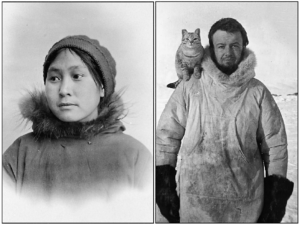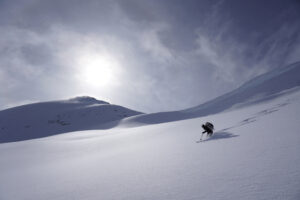Ray Zahab is not one for staying still.
An Explorer-in-Residence of The Royal Canadian Geographical Society, Zahab has crossed almost every desert on the planet and in 2009 broke the world record for the fastest unsupported trek to the South Pole. Now, the ultra distance runner and founder of the nonprofit impossible2Possible has set his sights on the Kamchatka Peninsula in far eastern Russia.
Zahab compares the Kamchatka Peninsula to Florida in the way it hangs off Russia, dividing the Pacific Ocean and the Sea of Okhotsk, but that’s where the similarities end. Kamchatka is known as the “land of fire and ice,” an unpredictable landscape of active volcanoes and snow blown in by icy Arctic winds. “If you’re over 40 years of age and you’ve played Risk, you know where Kamchatka is,” jokes Zahab. “If you wanna get Alaska, you have to take Kamchatka.”
Along with fellow ultrarunner Stefano Gregoretti, Zahab plans to traverse Kamchatka, unsupported, from the west to the east coast. And he’ll be sharing his adventure with the world.
The duo will trek through deep snow, dragging their gear on sleds, or “pulks.” They anticipate it will take them 20 to 30 days to cross the peninsula. But there are plenty of things that could slow them down.
Zahab and Gregoretti will navigate 500 kilometres over frozen rivers and through mountain passes. Avalanches are a big risk. So is broken ice, given that much of the expedition will involve travelling on rivers. Zahab had a scare in February 2017 when he broke through river ice in Saglek Fjord, Labrador. The near-death experience re-emphasized the need to put safety before speed.
“I have been over this route for Kamchatka every day for six months, staring at the computer, [from] one metre to the next,” Zahab says.
In addition to avoiding unnecessary risk, he wanted to make the route compelling and educational for the students that will be following his progress. The route passes through a diverse range of landscapes, from valleys of deep snow to an epic volcanic caldera. “I looked at myriad of ways of crossing Kamchatka. But to end up in those iconic volcanoes, in that caldera in that area, for me, was so important,” he says. “I wanted to take students on that journey.”
Sharing his experiences has been an important aspect of Zahab’s work since 2007, when he ran 7,500 kilometres across the Sahara Desert. That expedition was tracked by National Geographic and made into a documentary, Running The Sahara, produced by Matt Damon. The adventure became an opportunity to share stories about North African culture. When it was finished, Zahab knew that was what he wanted to do with the rest of his life.
“The reality is that through compelling adventure, you can learn extraordinary things about your world,” he says.
Zahab’s own story has involved plenty of learning. A college dropout, he went from smoking a pack of cigarettes a day to being a record-holding ultra runner. He was inspired by his brother, who made a similar change before him. “It’s 90 per cent mental; the rest is in your head,” he says. “I believe that people are capable of so much more mentally, physically, and emotionally than they give themselves credit for.”





